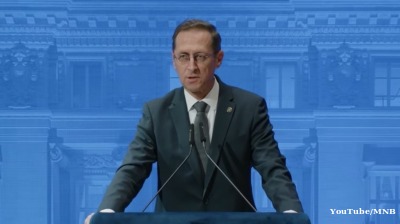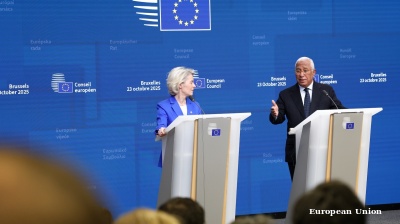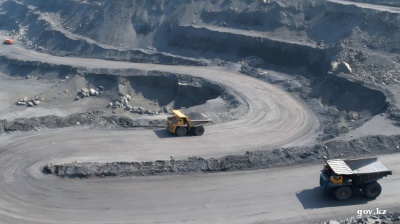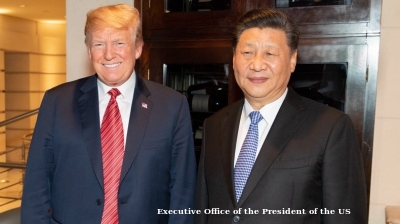Hundreds of thousands of people took part in rallies on the October 23 national holiday in Hungary, commemorating the 69th anniversary of the 1956 anti-Soviet uprising, as both Fidesz and its rival Tisza Party sought to show force by bringing out as many supporters as possible less than six months before the election.
Hungarian opposition leader Péter Magyar has called for a peaceful regime change and described it as the most important national holiday since the fall of Communism, according to leftist broadsheet Népszava. Viktor Orban said that those "misguided" people who are in favour of change of government are supporting the war.
The opposition leader argued that the majority of Hungarians recognise that the country is on a dangerous path, one that could lead to another national tragedy unless there is a fundamental shift in leadership.
He drew comparisons between the current political situation and Hungary's oppressive past, warning that the country is being led by what he described as a "Kádár-like" regime, referencing János Kádár, the communist leader who ruled Hungary from the end of 1956 until his death in 1989. Magyar claimed that under the current leadership, those who disagree with the government are marginalised and demonised, accusing the ruling party of labelling dissenters as "enemies" and using divisive language to paint those seeking freedom and prosperity as "criminals" or "insects."
The opposition leader also criticised the government for deviating from the democratic principles that the 1956 revolution sought to uphold. He accused the prime minister of centralising power, suppressing the press, and ruling through fear. Magyar pointed out that in 1989, Orban, as a young opposition figure, had spoken out against centralised power, but now, as Prime Minister, he has created a similar system that suppresses dissent and democratic values.
The 44-year-old opposition leader, a former Fidesz cadre member, made several references to Viktor Orban’s historic speech delivered in June 1989, during the reburial of martyred Prime Minister Imre Nagy and his followers. Many view this speech as marking the beginning of the fall of Hungary's Communist Party. Orban’s bold address catapulted him to prominence, where he called for the withdrawal of Russian troops stationed in Hungary since 1945.
Magyar continued, asserting that Hungary can only remain free and independent if its leaders do not bow to foreign powers in exchange for political gains or photo opportunities. He called for responsible leadership that prioritises Hungary’s sovereignty over external pressures.
The opposition leader also used the occasion to outline his party’s commitments for the upcoming elections, which include restoring judicial independence, joining the European Public Prosecutor’s Office, opening agent files, and introducing a national reconciliation law. He further outlined policies to protect national security, sovereignty, and democratic freedoms, as well as tax reductions, pension increases, and the introduction of a new child protection law.
"In just over 170 days, we will wake up in a free and smiling country," he said, referring to next year's general election. "For that to happen, we'll need humility, humanity, hard work and a great deal of patriotism," he said, announcing that he will set off on another nationwide tour dubbed the "Road to Victory".
Most independent polls show the Tisza Party is leading by double digits, except for those controlled by the government, which still forecast a slight Fidesz lead.
Meanwhile, Fidesz also went to great length to demonstrate its strength with a mass rally ahead of the April elections. With extensive party infrastructure and communication channels, the ruling party mobilised voters from across Hungary, including bus loads of people from smaller settlements. Opposition media reported seeing leaflets offering free food vouchers to participants, and numerous vehicles bearing Ukrainian and Serbian license plates were also spotted in central Budapest.
Orban’s supporters gathered on the Buda side of Margaret Bridge and marched through the city to Kossuth Square, where the Prime Minister delivered his speech. Before the rally, Orban expressed frustration that, despite his requests, EU summits often coincide with Hungary's national holiday. After the event, he flew to Brussels to attend the meeting.
Orban referred to the rally, dubbed the "Peace March," as the largest pro-government rally ever, describing it as "Europe’s largest patriotic movement." He urged supporters to stand firm against Brussels, which he claimed seeks to drag Hungary into war. He emphasised Hungary’s unique position as the only country in Europe to have maintained a "Christian, conservative, and nationally-minded" government for over sixteen years, stressing the importance of defending the nation’s sovereignty against external pressures, particularly from Brussels.
In his address, Orban reaffirmed Hungary’s role in defending peace, describing the country as the "capital of peace" in Europe. He called on his supporters to engage with "misled Hungarians" who favour a change of government, arguing that those voters are supporting policies that align with war. Fidesz is expected to continue the narrative in the election campaign that the Tisza Party is a puppet of Brussels.
Orban also referenced the legacy of the 1956 revolution, drawing parallels between the resistance against Soviet oppression then and Hungary's current opposition to what he called the "liberal and global forces" in Brussels. He repeated his accusations that the EU was blocking Donald Trump’s peace efforts regarding the war in Ukraine, remaining undeterred by the news that the Trump-Putin meeting had been called off.
The news of the postponement of the Trump-Putin meeting, which had placed both the government and Orban in the international spotlight for several days, caught the government and its media off guard.
Following the rallies, debates intensified over the size of the turnout at the two events. Political analysts and online commentators engaged in discussions, with both sides claiming their rallies had a larger crowd. Social media platforms were flooded with images and estimates, further fuelling the ongoing political discourse.
While Fidesz successfully filled Kossuth Square in front of Parliament, the Tisza rally saw Budapest's iconic Heroes' Square packed to capacity, with people stretching along Andrassy Boulevard leading to the square. A Facebook post of a photo shot from a commercial plane depicting that image went viral on social media.
Peter Magyar later posted: "We are the majority."








